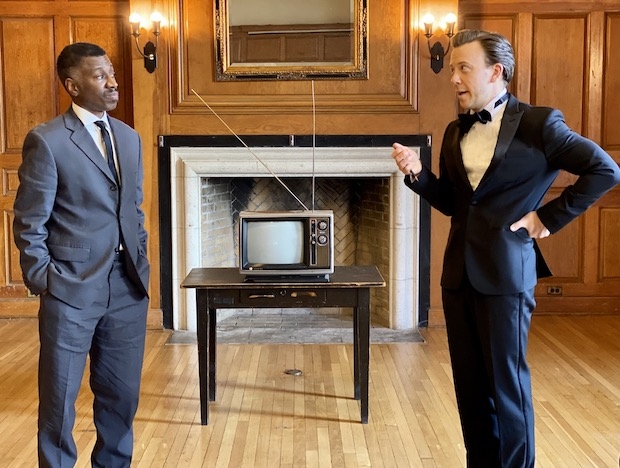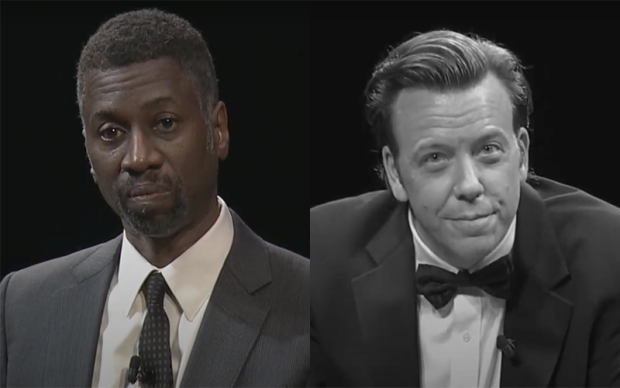Review: Debate: Baldwin vs. Buckley Revisits an Argument From 1965 That We're Still Having
The American Vicarious re-creates the Cambridge Union debate between James Baldwin and William F. Buckley Jr.

(© Christopher McElroen)
On February 18, 1965, James Baldwin and William F. Buckley Jr. went to the Cambridge Union to debate the question, "Has the American Dream been achieved at the expense of the American Negro?" Baldwin was already a star writer, author of the novels Go Tell It on the Mountain and Giovanni's Room, as well as searing tracts on race like "Letter From a Region in My Mind" (which provoked so much of the ire of his opponent). Buckley was the founder of the National Review and arguably the most eloquent spokesman for American conservatism, with the ability to sheath that often cruel ideology in 10-dollar words spoken through a patrician purr. Their debate (argued alongside two Cambridge undergrads) is one for the ages, and can still be viewed today. So what can a live staging of the transcript add to our understanding of the event?
The American Vicarious gives audiences a palpable sense of the electricity, animosity, and history coursing through the room with Debate: Baldwin vs. Buckley, now playing at the A.R.T./New York South Oxford Space in a wood-paneled room that evokes the hallowed halls of England's second most important university. Director Christopher McElroen and video designer Adam J. Thompson frame the live staging with video of the original debate, played on a fuzzy old black-and-white TV. With the exception of Baldwin (Teagle F. Bougere in a smart gray suit), the debaters wear black tie, prepared at a moment's notice to adjourn to billiards and brandy (historically accurate costumes by Elivia Bovenzi). Baldwin's less formal attire and his Blackness in this overwhelmingly white setting would seem to make him the outsider — and yet it is he who receives the warmer reception.
After a brief opening round by David Heycock and Jeremy Burford (Spencer Hamp and Charlie O'Rourke, both convincingly playing undergraduates, albeit with suspiciously American accents), the main event begins with Baldwin: Bougere takes an already impassioned speech and infuses an extra shot of emotion, strategically adding breaths, sighs, and pauses to emphasize the exhausting work of explaining his oppression to an audience that will never feel it personally. This is not vocal mimicry: Bougere has far more range and resonance than Baldwin, and never attempts his subject's sophisticated, slightly nasal tenor. Yet the unforgettable line from his 24-minute speech lands with as much incontrovertible power as it always has: "I picked the cotton, and I carried it to market, and I built the railroads, under someone else's whip — for nothing." When so much of America as we know it has been built through slave labor, how could we not agree that the American Dream has been at the expense of Black people?
It is in the wake of a house-wide standing ovation that Buckley (Eric T. Miller) rises to rebut the motion. Miller comes much closer to re-creating the actual voice of Buckley, the knife-like diction, the genteel rage animating every syllable. With cool precision he cites statistics ("a greater degree of material well-being to the American Negro than that which is enjoyed by 95 percent of the other peoples of the human race"). He excoriates Baldwin's anarchic disdain for civilization (a fundamental misrepresentation of his opponent's argument). He even wears the damn cummerbund — and yet he knows he is in hostile territory, fighting a lost cause before these spoiled children of British aristocrats who would dare sneer at the inequities of his beloved country. For one hour, Miller fully embodies the resentment of the American man who has done everything he was taught to do, and is still being shunned for it (just as he did for a very different kind of American male in Mope).

(© The American Vicarious)
The result of the evening (Baldwin wins the house vote in a landslide) is a foregone conclusion, even for those encountering the debate for the first time. McElroen and his team (including artist-in-residence Jaymes Jorsling) still find ways to make the live event dramatic, to make the heart skip a beat through the arrival of the unexpected and old words heard in a new way. The actors are not tethered to their lecterns and are free to wander the room and connect with every audience member (and they do). Unfortunately, McElroen has not devised a compelling way to end Debate, a creative liberty the audience would certainly allow him after such an excellent display of acting and rhetoric.
Ultimately, it is the novelty of the source material that makes Debate: Baldwin vs. Buckley worthwhile. It is difficult to imagine such a debate ever taking place in 2022 — Nicole Hannah-Jones going head-to-head with Ben Shapiro on the question of America's immutable foundation in racism. Certainly, the speakers would not be as edifying as Baldwin and Buckley. And they would never be given so much time to state their case without being interrupted by some showboating moderator. Yet the question of "systemic racism" is more central to American race relations than it was in 1965, even as our notions of reality have become so divergent as to preclude our meeting on the same stage to discuss it. This is the "turning away" that Baldwin so presciently warned about in his remarks — and it is a disengagement Americans of all races are embracing.








